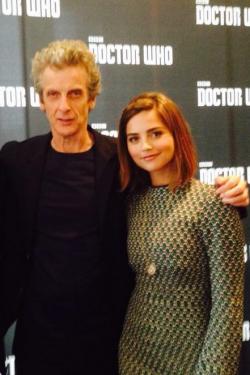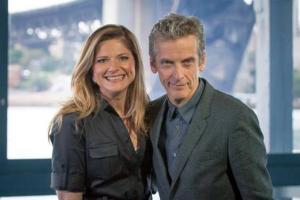Rivers of London: A Web Interview with Ben Aaronovitch, Andrew Cartmel and Lee Sullivan
Doctorwhonews.net was given the combined pleasure and honour of having an in-depth chat over the internet to these 3 imaginative and uniquely skilful individuals, who combine skill with words and pictures to tell spellbinding stories, based on Ben Aaronovitch's original book series 'Rivers of London'. (A list of the novels follows at the end of this article).
The hope with the comics of 'Rivers' was to 'move the franchise a bit sideways' according to Ben and '[have] a chance to get pictures drawn. The whole adventure of fun stuff. Comics are a lot of fun.'
Jokingly, and warmly Ben pointed out the sheer hard work Lee Sullivan puts into his visual, to which his response was "No I don't think of [those] fondly at all [tricky] cafe scenes at the moment. Or don't do any [art] set in a fair ground."
Andrew Cartmel then elaborated on the aims and hopes further: "Ben always wanted to write comics because he kept having these great comic ideas that he'd tell me. [And was especially keen to do Batman]".
That turned the conversation into which comic franchises and authors were favourites with Ben and Andrew:
Ben stated how he was '[an] agnostic in comics' and that he 'read ones that [he likes with no] favourite universe. "I like Alan Moore."
Andrew seconded this opinion: "You can put me down for that too. Alan Moore is the greatest comic writer who ever lived...[and] a huge influence on me as a writer".
I then queried Ben on the influence of London itself, asking how it generated ideas for stories, for characters, and social commentary:
"[Based on my home city being London I choose to set the story [there]. I am blessed that [my home town] London is the greatest city in the world, and the most interesting. Apart from that it is mainly because I am a Londoner. Andrew is just stuck with it!
Some concurrence from Andrew: '[I was born in London myself]..and I do love London it is very true.'
I then turned to the topic of successfully balancing humour and drama; which to my mind, as a child of the McCoy era, was one of the biggest pluses of that period in Doctor Who history.
Andrew put it as such "When you are writing it has got to be a mountain range and not a plateau, or a prairie. It has got to have variation. Humour is a brilliant way of alternating with the drama; hence the term 'comic relief'. [If something is relentless drama] then you understand the desperate need for variation."
Ben agreed with his long-time colleague and friend: "What he said."
Characterisation and having believable villains was the next topic for debate with my interviewees:
Andrew believes that an 'interesting [villain] is the crucial thing', more so than how they might be relatable to a given reader.
Ben elaborated on the aim of a "realistic thing in quite a realistic world." and also how "[antagonists] have that kind of balance. We don't have super villains....We don't really have bad people."
Andrew then gave further elaboration "What Ben calls moustache twirlers [or] melodramatic, one-dimensional villain[s]"
We then had a bit more of a chat on characterisation in general:
Andrew emphasised how "with character development, unless you create likeable [and] interesting characters, then all the stuff that happens to them is just irrelevant."
Ben then tied this to the central character of 'Rivers of London' - Peter Grant - being a detective and how he fulfilled a given 'function' in this kind of 'detective genre':
"If you think about the [most popular/ well-known] detectives like [Inspector] Morse, [Miss] Marple .. [and] Sherlock Holmes they are, what happens to other people to develop their characters...[thus] you don't need to worry quite so much with detectives. So [regarding overall characterization] it's organic, and [how much a given character grows depends] on what [those characters] want to do usually."
Then talk by Andrew over how the basic foundation of good character elements will allow a strong story to unfold overall "[as a budding writer one finds] that other characters tend to take over [and the story writes itself] It's wonderful when that happens, which it does if you just persist."
This then led to Lee sharing some of his own thoughts on how enjoyment can be found in giving visual interpretation to characters: "Nightingale is the one that fascinated me most.. because he is a guy out of time [and..] quite a bit older than he looks. So it's fun [making] him look a bit stiff and slightly ill at ease with today."
Ben than showed his appreciation for Lee's work, adding to his statement into just how much work goes into the characters being drawn:
"The quality work you get with Lee [is considerable]. He does not just go [in kamikaze] with his artwork] ... None of the [other artists Andrew and I were to work with before the Rivers series got off the ground] were not a patch on Lee, who is amazing."
Having read and enjoyed the premiere issue of 'Rivers': Nightwitch and noticed its globe trotting aspects I decided to ask if travel to other capital cities had inspired Lee in terms of his approach to comics' art and the portrayal of various things?
Lee stated how "Every city has got a good feel to it.. the impressive ones are [those with] most contrast to where you come from, I guess. Tokyo [stands out despite being] nearly 30 years ago... The western bits they bolted on top of their culture are very recognisable but then you realise that at home you don't put your washing machine outside of your house. That is a cultural difference and you can do that [there] because they are made of plastic. Because they are plastic, they can be made in all candy colours. And so these kind of things are wonderful without having to go somewhere different."
I then enquired about comic book storytelling as a specific storytelling framework, and how it can be used to try and get perhaps a less than realistic reflection on our world [on occasion]. Andrew responded "in terms of art.. Ben does something called an 'art shift', where we might move from he realistic to the cartoony."
Ben then backed this up stating "What I like about writing the comics is that you have access to all sorts of techniques you can't use in a book. and now we have acquired someone of} Lee's capabilities [to portray all these characters, and visual elements].."
Andrew gave a hint of an upcoming Rivers issue later on in the new Nightwitch run: "he has just done a fantastic [art] piece that looks like a Russian icon, and is absolutely gorgeous I have to say."
Ben again spoke of the storytelling techniques: "[with our] comic book storytelling techniques.. the people are more realistic, but not so much the settings or the things that happens to them."
I then queried how the comics and the ongoing novel series interlink with one another and Ben put across how he treats them all as the same thing. "Some are comics and some are books. I don't really think of [the two as separate entities]. They are all part of the same universe, and so all are equally important. I have a very playful attitude to my universe. I am not too po-faced about it. I have put as much creative energy into the comics [for [ the characters, the new things and the ideas. And I know that Andrew does. I don't have a hierarchy of canon."
I then asked Andrew how a climax or cliffhanger is shaped in the storytelling he and Ben serve up with each issue:
"We do put a lot of thought into what is a left hand page, and what is a right one, as that [is crucial in determining] what is a surprise to the reader. You wait for them to turn the page over and reveal something."
Unfortunately time was finite for us, even if the Doctor knows a way round that issue, so the interview did draw to a close, but a lot of laughter and amusement that (often) embodies a harmonious working unit was clearly evident, over the Skype internet connection that I had, with the talented triumvirate.
Please have a look at the full interview in the review section later this week, which includes further chat on Lee's illustrious back catalogue of work, and how he goes about realising his creative vision as an artist.
****
Ben's published Rivers of London book series to date:
1) Rivers of London
2) Moon over Soho
3) Whispers Underground
4) Broken Homes
5) Foxglove Summer
6) The Hanging Tree


 On the whirlwind visit to Sydney as part of the Doctor Who World Tour, Peter Capaldi made time for a chat with Julia Zemiro for ABC TV, and When Julia Met The Doctor, which aired in Australia Wednesday 20 August, was the result.
On the whirlwind visit to Sydney as part of the Doctor Who World Tour, Peter Capaldi made time for a chat with Julia Zemiro for ABC TV, and When Julia Met The Doctor, which aired in Australia Wednesday 20 August, was the result. 






